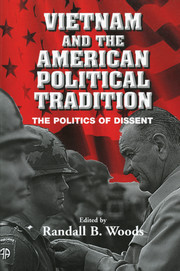Book contents
- Frontmatter
- Contents
- List of Contributors
- Introduction
- Anti-Imperialism in U.S. Foreign Relations
- World War II, Congress, and the Roots of Postwar American Foreign Policy
- The Progressive Dissent: Ernest Gruening and Vietnam
- “Come Home, America”: The Story of George McGovern
- Congress Must Draw the Line: Senator Frank Church and the Opposition to the Vietnam War and the Imperial Presidency
- Dixie's Dove: J. William Fulbright, the Vietnam War, and the American South
- Advice and Dissent: Mike Mansfield and the Vietnam War
- The Reluctant “Volunteer”: The Origins of Senator Albert A. Gore's Opposition to the Vietnam War
- A Delicate Balance: John Sherman Cooper and the Republican Opposition to the Vietnam War
- Friendly Fire: Lyndon Johnson and the Challenge to Containment
- Richard Nixon, Congress, and the War in Vietnam, 1969–1974
- Index
Introduction
Published online by Cambridge University Press: 21 November 2009
- Frontmatter
- Contents
- List of Contributors
- Introduction
- Anti-Imperialism in U.S. Foreign Relations
- World War II, Congress, and the Roots of Postwar American Foreign Policy
- The Progressive Dissent: Ernest Gruening and Vietnam
- “Come Home, America”: The Story of George McGovern
- Congress Must Draw the Line: Senator Frank Church and the Opposition to the Vietnam War and the Imperial Presidency
- Dixie's Dove: J. William Fulbright, the Vietnam War, and the American South
- Advice and Dissent: Mike Mansfield and the Vietnam War
- The Reluctant “Volunteer”: The Origins of Senator Albert A. Gore's Opposition to the Vietnam War
- A Delicate Balance: John Sherman Cooper and the Republican Opposition to the Vietnam War
- Friendly Fire: Lyndon Johnson and the Challenge to Containment
- Richard Nixon, Congress, and the War in Vietnam, 1969–1974
- Index
Summary
Political and diplomatic history have fallen into disrepute of late. They are, critics proclaim, concerned with power, elites, and white males, both living and dead. The subfields are allegedly subject to “top-down” treatment and largely ignore the inarticulate, disfranchised, and powerless. All of this is true; much work in diplomatic, and to a lesser extent, political history seems repetitive, overly abstract, and unimaginative. And yet, if one reads the New York Times or listens to National Public Radio, much of the reporting has to do with politics at home and abroad, and the interaction between nation states. That is so because educated laypeople find such topics not only interesting but important. They do have a point. In the United States, at least, the national political arena is not only where interests project their power but where the people's representatives discuss the nation's values and goals, in the process forging its very identity. The realm of international relations is where national goals, values, and ideologies compete, coexist, conquer, or perish. In the aftermath of the Cold War the threat of religious, ethnic, and tribal conflict has become as important as the danger posed by international warfare. Nevertheless, power is still exercised to a large extent by national governments, both internally and externally. In truth, though, the distinction between culture on the one hand and politics and diplomacy on the other is artificial.
- Type
- Chapter
- Information
- Vietnam and the American Political TraditionThe Politics of Dissent, pp. 1 - 11Publisher: Cambridge University PressPrint publication year: 2003

